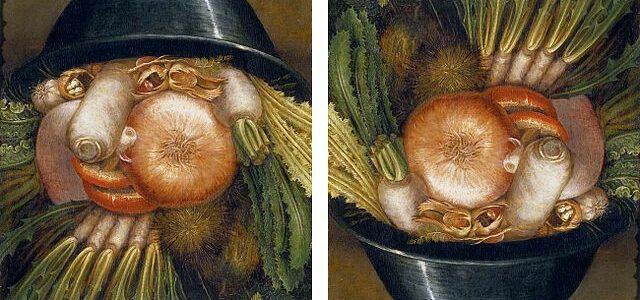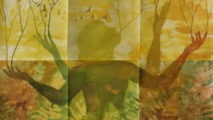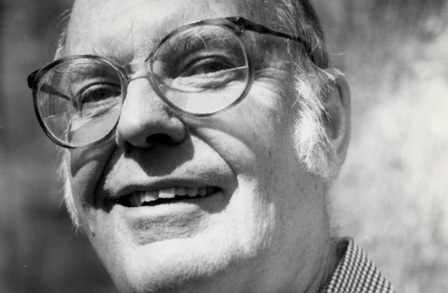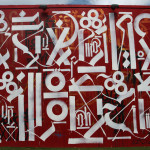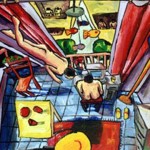Inspired in part by Annibale Carraci’s painting The Bean Eater (c. 1580-1590) and Giuseppe Arcimboldo’s fruit and vegetable “portraits” (c. 1590)
“Boil us, bake us, put us in a pot!”
I heard this emanating from the kitchen one evening about a month after I had moved into my house, which had been Mrs. Vincarelli’s throughout my childhood. Her children had all moved to Florida and were happy to sell to someone they knew, someone born and raised in the neighborhood. So here I was…hearing voices in what still felt like someone else’s house.
“Boil us, bake us, put us in a pot!”
A merry chant, not menacing, but then again, strange voices in one’s kitchen – especially after sundown—strike me as unsettling.
I entered the kitchen. Floating just above the stove was a figure, now a man, now a woman, sometimes a little of both, about two feet tall. Now comes the weird part: the creature consisted of swirling beans…cannellini, ceci, lenticchie, black beans, white beans, red beans, streaky borlotti. Coalescing and dispersing, reforming in slightly different guises, periodically saying:
“Boil us, bake us, put us in a pot!”
I goggled at the bean-thing (apparition?). It seemed satisfied to dance above the stove, while gesturing at my pantry. Flummoxed, unnerved, I called my uncle Tony.
Uncle Tony is the self-proclaimed head of the family, now that my grandparents are dead. The rest of us humor him, especially when he gets nostalgic for Italian places he has never visited, but we have to admit that in times of crisis Uncle Tony is our go-to guy. He is what we call a “saputo,” a “know-it-all,” at least in the Tuscan peasant dialect that our forebears spoke. Irritating at times, sure, but usually with a kernel of information on obscure topics that was handy when we needed it. Like precisely now, for instance.
“Hey, Uncle Tony,” I said. “Please, you gotta come over, right away.”
“Frankie,” he said. “You sure it can’t wait? You know the Nets are on…”
“Got something even better,” I said. “A…ghost or something, dancing in my kitchen.”
We prank each other a lot in our family, so it took Uncle Tony a while to believe me. He lives four blocks away, so he arrived within minutes.
“Holy shit!” he said, inspecting the bean-figure as it capered.
“Do you think it’s a ghost?” I said. “Mrs. Vincarelli come back? ”
Uncle Tony shook his head.
“No way,” he said. “She was mean but efficient. She wouldn’t bother coming back as a haunt once her time here was done.”
(“Boil us, bake us, put us in a pot!”)
He was watching the bean-arms.
“What you got in your pantry?” he asked.
“What?” I said. “Right now you’re hungry?”
“No, no…but we’re gonna have to check what you got in there.”
He rummaged through the shelves, which were well stocked since I had recently moved in, and I like to cook.
“Ah hah!,” said Uncle Tony, in triumph. “Look at these!”
He was waving a can of beans in each hand.
“So what? Your point is…?”
“Rispetto,” he said, and I knew a lesson was coming because he always sprinkled Italian into his speech whenever he started lecturing, even though he was born in New Jersey just like the rest of us.
“Alora! You know what we’re called back home in Tuscany?”
I always sigh when I hear Uncle Tony describe Tuscany (the hills around Pistoia to be exact) as “home” when three generations of our family have been raised within a few miles of this or that exit along the Garden State Parkway. But I play along because he is not entirely wrong either.
“Sure, the mangiafagioli,” I say (even I know this much Italian). “The bean-eaters.”
“Precisamente! We were mezzadri, sharecroppers, and since all we could afford was beans, we became bean-experts. We knew our beans!”
I arched an eyebrow but kept listening.
“Remember the stories your nonna used to tell, about her mother, your bisnonna, arriving in the States?”
And then suddenly I did remember!
“Yeah,” I said. “She had only the clothes on her back, and a little cardboard suitcase…but in that suitcase was a treasure from home…a bag of beans…”
“Cannellini,” said Uncle Tony, his eyes focused faraway, as if he had been there himself.
(“Boil us, bake us, put us in a pot!”)
The vision faded, for me at least.
“Okay,” I said. “But I don’t get how great-grandma’s bag of beans connects to ….whatever this thing is that’s doing calisthenics in my kitchen.”
“Beans in cans are fine,” said Uncle Tony, in full saputo mode. “We’re in America now, life is busy, no time to cook over the forno like in the Old Country, not every day. Everyone understands…but now and then, every now and then, you gotta go old school, I mean back to the original.”
(“Boil us, bake us, put us in a pot!”)
I still did not understand.
“Beans, like those,” said Uncle Tony, pointing at the legume-figure. “You have to select them with care, clean them, sort them, soak them overnight. You need to boil them slowly, stirring (that’s mescolare, I think) and tasting. Mix in your sage and your thyme, a little onion, dash of pepper, drop of best olive oil.”
Comprehension dawned at last.
“Honoring the beans,” I said.
The beans grew to a manikin three feet tall, saluted, and vanished.
So that’s it. Once a month or so, I prepare beans the old-fashioned way, and the spirit of the bean is content. I sense its presence on the edge of vision, maybe I hear its words early on a Saturday morning. That’s all good: my hearth is complete now, protected and satisfied.
On the other hand, my hot water heater is wonky. It moans in the basement but that is purely mechanical (I think). I mean, we had no running water in Tuscany, let alone heated water, so I cannot imagine there’s a guardian spirit of plumbing or whatever to appease.
Still, just to be sure, I am calling Uncle Tony this weekend.
Daniel A. Rabuzzi (he / his) has had two novels, five short stories, 30 poems, and nearly 50 essays / articles published (www.danielarabuzzi.com). He lived eight years in Norway, Germany and France. He earned degrees in the study of folklore & mythology and European history. He lives in New York City with his artistic partner & spouse, the woodcarver Deborah A. Mills (deborahmillswoodcarving@earthlink.net)
Related Posts
« Bisques & Address to My Phantom Limb – Judith Skillman AILEEN – Marc Egnal »
